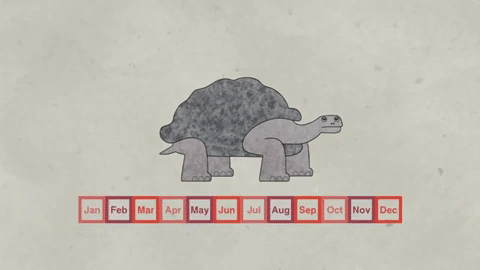Why does one species live longer than another?
Mice end their lives after four years. Meanwhile, turtles can live up to more than 100 years and Antarctic whales, the oldest mammals on Earth to 200 years. Most living animals gradually age after reaching the physiological maturity level in the life cycle. So what does aging mean and why does one species live longer than another?

Why is there aging?
The agents behind this process are diverse and complex, but they are essentially caused by cellular disorders and death. When we are young, cells are constantly being produced to replace old and dead cells. But as we get older, this process becomes slower. Not to mention, the old cells can not work as well as before causing our bodies to gradually degenerate, leading to illness and death.

Why is there a difference in life expectancy in the animal kingdom?
The answer lies in many factors, including the environment and body size:
Environment affects longevity
Let's go to the Atlantic and Arctic Oceans, where Greenland sharks can live for more than 400 years and Arctic Quahog sea shells can live up to 500 years. The most impressive of the long-lived marine animals is probably the Atlantic sponges, which can live for more than 10,000 years. In cold environments like this, the heart rate and metabolism slow down, which slows down the aging process.

Size affects lifespan
When it comes to body size, more often than not, species with larger bodies live longer. For example, elephants or whales will live longer than rats and mice are longer than flies and worms.

Size is an important factor in evolution in animals. Smaller creatures are easy prey for large animals. For example, mice can hardly live more than a year in the wild. As a result, they have evolved toward faster development and reproduction in response to their limited lifecycle. In contrast, larger animals are easily out of sight of predators so they have time to grow in size and reproduce many times during their lifespans.

There are still other cases where animals with similar characteristics, having the same size and habitat have completely different life cycles. In this case, genetic differences, immunity are the factors that make the difference in life expectancy. Therefore, the combination of all these factors and the different levels of each species has created a diversity of longevity in the animal world.

So what about us?
Mankind has recently reached an average life expectancy of 71 years , which is still far from being one of the oldest species on Earth. But we can hope for the possibility of extending our life cycle in the future.

In the early 1900s, humanity lived only about 50 years. Since then, we have gradually adapted to controlling mortality factors such as lifestyle and nutrition. This, along with the development of other factors such as health, makes us the only species on Earth that can affect our natural destiny.
- Why do people live longer than monkeys?
- Scientists find a way to calculate the life span of animals
- Huge mammals live harder, become extinct faster
- 5 unexpected things to help men live long
- The more a person whose name is unique, the longer he will live
- Drink less alcohol, live longer?
- Bad habits help us live longer
- Agile people live longer
- Strange species of almost 'immortal' creatures
- Women still live longer than men
- Inventing drugs that make people live longer
- Why do people live longer than monkeys?
- Muscular men will live longer
- Read electronic newspapers to help you live longer
 Animal 'suffering' after hibernation
Animal 'suffering' after hibernation Why do goats climb well?
Why do goats climb well? Scientists were surprised to see chimpanzees eating turtles
Scientists were surprised to see chimpanzees eating turtles Giant catfish died deadly due to drought in Thailand
Giant catfish died deadly due to drought in Thailand